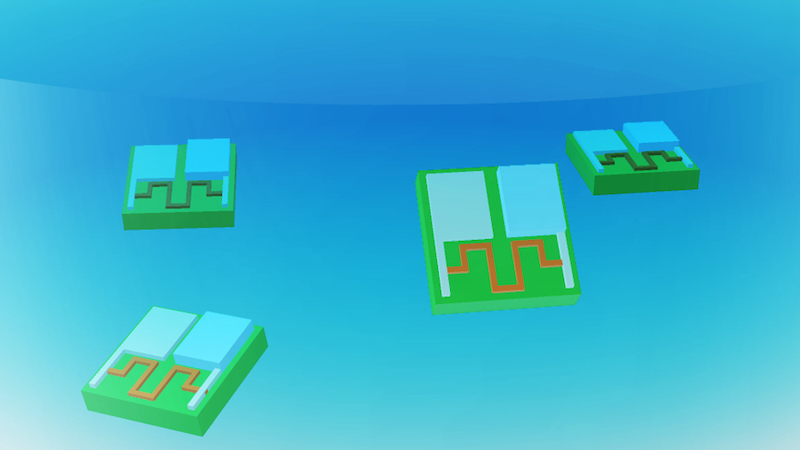
Researchers at the Massachusetts Institute of Technology (MIT) have developed a tiny zinc-air battery that can power robots just the size of human cells. The aim is to specifically administer medication to the body.
Researchers at the Massachusetts Institute of Technology (MIT) developed recently developed a tiny battery designed to power cell-sized robots. Doctors could use these robots in medicine to deliver drugs specifically to the human body. But they could also be used to identify leaks in gas pipes, for example.
The new battery is just 0.1 millimeters long and 0.002 millimeters thick. That’s about the thickness of a human hair or the size of a grain of sand. It uses oxygen from the air to oxidize zinc and thereby generate an electrical voltage of up to one volt. This energy is enough to power small circuits, sensors or actuators.
Cell-sized robots gain autonomy through zinc-air batteries
One of the biggest problems in developing such microrobots is the energy supply. While other approaches rely on solar energy, this solution is often impractical because the robots often move in dark areas. However, with the new zinc-air battery they could achieve greater autonomy.
The battery has a high energy density and is characterized by a long service life. It consists of a zinc electrode connected to a platinum electrode. The electrodes are also embedded in a strip of polymer. When these electrodes react with oxygen molecules, the zinc oxidizes and an electric current is created.
Operation of different devices is already possible
In initial tests, the researchers were able to show that the battery provides enough energy to move a robot arm. It could also operate a memristor, which stores electrical resistance, and a circuit for measuring time. It was also possible to operate sensors that change their electrical conductivity upon contact with certain chemicals.
The researchers are now working on increasing the voltage range of the battery to enable even more versatile applications. In the future, it will be integrated directly into robots so that they can work completely autonomously.
In the long term, the researchers plan to develop robots that doctors can inject into the human body, for example, in order to deliver targeted medication. These robots could then be made of biocompatible materials that self-decompose after use.
Also interesting:
- Researchers develop the world’s first sodium battery without an anode
- Flash Joule Heating: Sustainable recycling of lithium-ion batteries
- Jelly battery: Researchers develop a new type of battery – inspired by electric eels
- Researchers are making environmentally friendly batteries from old solar panels
The post Smaller than a grain of sand: Researchers develop batteries for tiny robots by Felix Baumann appeared first on BASIC thinking. Follow us too Facebook, Twitter and Instagram.
As a Tech Industry expert, I am extremely excited about the development of batteries for tiny robots that are smaller than a grain of sand. This innovation has the potential to revolutionize the field of robotics by enabling the creation of incredibly small and agile robots that can perform tasks in a wide range of environments.
The development of these miniature batteries is a significant technological achievement, as it requires overcoming numerous challenges such as size constraints, energy storage capacity, and power efficiency. The fact that researchers are making progress in this area is a testament to the rapid advancements being made in battery technology.
These tiny robots could have a multitude of applications, from medical devices that can deliver targeted treatments within the body, to environmental monitoring sensors that can be deployed in hard-to-reach locations. They could also be used in search and rescue missions, exploration of hazardous environments, or even in the field of nanotechnology.
Overall, I believe that the development of batteries for tiny robots is an exciting development that has the potential to open up new possibilities in the field of robotics. I look forward to seeing how this technology evolves and the innovative ways in which it will be used in the future.
Credits